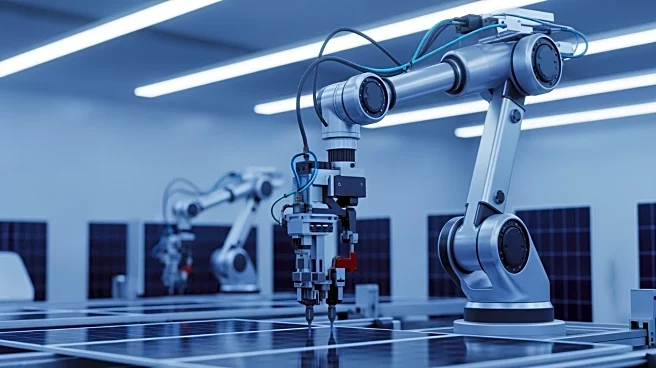What's Happening?
Yingkou Jinchen Machinery Co., Ltd. has launched its next-generation multi-busbar PV cell stringer models, JC-CHA8000 and JC-CHA10000, aimed at transforming solar module manufacturing. These models offer
comprehensive solutions to streamline production, improve yields, and reduce waste. The equipment supports a wide range of cell formats and boasts impressive uptime and rejection control metrics, ensuring high-quality production. Jinchen's commitment to innovation and reliability is further supported by a robust service team, providing technical support to minimize downtime and maximize operational efficiency.
Why It's Important?
The introduction of advanced PV cell stringers by Jinchen is significant for the solar industry as it promises enhanced productivity and quality control. By reducing waste and improving yields, manufacturers can achieve cost-effective production, which is crucial in the competitive renewable energy market. This development supports the industry's shift towards more sustainable energy solutions, potentially lowering costs for consumers and increasing the adoption of solar technology. Jinchen's innovation could set new standards in solar manufacturing, influencing industry practices globally.
What's Next?
Jinchen's new stringer technology is expected to drive further advancements in solar module production. As manufacturers adopt these models, there may be increased demand for Jinchen's solutions, potentially leading to more partnerships and expansion in the solar sector. The company's focus on technological advancement and efficiency could inspire other manufacturers to innovate, fostering a competitive environment that accelerates the growth of renewable energy technologies.
Beyond the Headlines
The launch of Jinchen's advanced stringer models may have broader implications for the solar industry, including potential shifts in manufacturing standards and practices. As efficiency and quality become more attainable, there could be increased pressure on other manufacturers to adopt similar technologies, leading to a more sustainable and competitive market. This could also influence policy decisions regarding renewable energy incentives and regulations, as governments seek to support industries that contribute to environmental goals.











